2020 Carnegie Classification Cycle Launches at Swearer Center on Jan. 22

(PROVIDENCE, R.I.) -- On Monday, Jan. 22, 2018, The Carnegie Foundation for the Advancement of Teaching & The Howard R. Swearer Center at Brown University released the newly revised application frameworks for the 2020 Elective Carnegie Community Engagement Classification. Using these frameworks, colleges and universities with an institutional focus on community engagement are invited to begin the application process for the Classification, first developed and offered in 2006 as part of a restructuring of the Carnegie Classification of Institutions of Higher Education. The Swearer Center became the administrative and research host institution for the Classification in January 2017.
The first-time and re-classification frameworks, which outline questions that will be asked in the formal application process, can be accessed by visiting the Swearer Center’s website for its College & University Engagement Initiative. Interested campuses can submit completed applications online via a web portal beginning May 1, 2018. The deadline for applications is April 15, 2019.
The elective classification provides a special-purpose classification for institutions with commitments in the area of community engagement. It is intended to assist in a process of institutional change to improve the educational effectiveness of the campus through the institutionalization of community engagement. The classification framework represents best practices in the field and encourages continuous improvement through periodic re-classification.
A total of 361 institutions are currently classified as Carnegie Community Engaged campuses. Campuses that received the Classification in 2010 may undertake re-classification in order to retain the Classification. Campuses classified in 2015 do not need to apply for re-classification at this time. Campuses that received the classification prior to 2010 and did not re-classify in 2015 are not eligible to re-classify, but are invited to again participate in the first-time classification.
In each five-year classification cycle, changes are made to the documentation framework. These revisions are incorporated into the existing framework and reflect changes in the community engagement field and/or gaps identified in the framework. Each cycle the revision process is refined, becomes more formal, and includes an increasingly diverse set of contributing mechanisms. You can find more information about the 2020 framework revision process and the plan for 2025 revisions linked here.
The Carnegie Classification process offers campuses an opportunity for self-study and institutional assessment to advance community engagement. As a community engagement center director offered after the 2015 classification, "this is one of the highest forms of recognition possible in our field" and "allowed us to lift up elements of our institutional mission and distinctiveness that are not necessarily represented in the national data on colleges and universities."
The Swearer Center is committed to making regular updates to its website, listed above, which features a timeline and resources to support applicants including workshops, webinars, publications, and assessment tools to measure the inputs (ex. National Inventory of Institutional Infrastructure for Community Engagement - NI3CE) and outputs (ex. National Assessment for Service and Community Engagement - NASCE) of community engagement on your campus.
For general inquiries regarding the Carnegie application process and our web resources and tools, please contact Swearer Center Research and Assessment Manager Georgina Manok at [email protected] or (401) 863-3638. For guidance related to application content, please contact Swearer Center Distinguished Engaged Scholar in Residence John Saltmarsh at [email protected] or (617) 287-7743.
